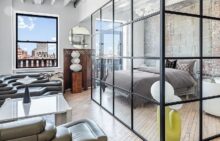all electric buildings

Started by ANDYOH
almost 15 years ago
Posts: 23
Member since: Nov 2009
Discussion about

i have seen a couple of all electric bldgs recently including 433 east 56. anyone know the plus and minus of all electric.


You cannot cook burning natural gas. So if you do a lot of Chinese cooking using the "wok", then it would be a problem. You also cannot use a natural gas dryer. Cost wise, electric is a bit more expensive than gas
The plus for all-electric building is no risk of carbon monoxide poisoning from gas. The minus side is cost (mainly on heating). But, there shouldn't be more than 20% difference.
There is electric induction cooktop that can heat up higher temperature and faster than gas cooktop. A lot of dryers offer electric version.
At the end, there is not much difference between all-electric vs electric/gas building.
Electric is way more expensive than gas (and steam heat).
New York is funny, the vast majority of the US is electric, only here is it a novelty.
i'm paying $200 per month to heat my apartment with gas heat. if it would be electric, i would expect at least $400.
my friend, may years ago, was using electric to heat her 1 br at approx. $150 per month. she worked, so it was off during the day.
We're in an all-electric building with individual HVACs and water heaters. I believe it exempts us from some insurance requirements, like boiler coverage, but I'm not 100% clear on the details.
Our electric bill for a one bedroom + den, with high ceilings, northern exposure, and horrible insulation, has never gone above $250 per month, but we do keep the heat at 58 while we're at work (9 a.m. - 7 p.m.)
I'm not a chef by any means, but I actually prefer our electric glass cooktop to a gas stove. It heats up very quickly, evenly, and I never burn anything the way I used to. I'd be sad if I had to go back to gas at this point.
The heat pump does not do as well as a gas heater at really cold temperatures, but we're fine with a space heater or electric blanket. The plus is that we have true central air, with a roof-mounted compressor, which I wouldn't trade for anything.
The one big drawback of an all-electric building for me is the electric water heater. I can't seem to get as hot of a shower as I'd like, and if my significant other and I shower back-to-back, whoever goes in second is in for some chilly water temperatures. And we have the temp set at 140, which is the highest recommended setting.
There's a lower first cost for the developer, as it can be cheaper to provide heavier wiring and domestic appliances than to engineer a central system to heat/cool and pump water.
I don't know whether its cheaper to pay for fuel on your own rather than pay your share of central HVAC via maintenance/CCs.
All that cost balancing changes over time. In the early 20th century, before the cost of electric refrigerators went down, buildings had central brine systems that pumped cold water to each unit.
if there is a hot water heater in each apartment, is there a greater risk of water leaks and damage to my apartment or the apartment directly below?
Hopefully the building requires the pressure relief valves to be hard-piped into a drain and to have a master shutoff valve within each apartment. I believe our building now requires both of the above with new renovations, and there have been no issues since.
But, yes, individual water heaters and HVAC units will put apartments at greater risk for leaks. You can help this somewhat by replacing these items toward the lower end of their useful lifespan -- every 8-10 years for water heaters and 15-20 for HVAC units.
thanks lad, info is useful. we are a little concerned.
Hey lad, set it higher than 140�. That's not a bad setting, but if it's not working for you, maybe an extra 5� would help. Or maybe the thermostat is not working properly and the temperature is actually less.